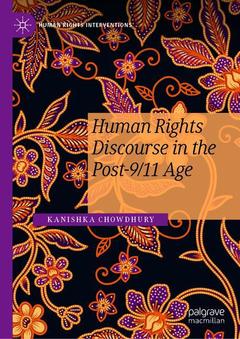Description
Human Rights Discourse in the Post-9/11 Age, 1st ed. 2019
Human Rights Interventions Series
Language: English
Subjects for Human Rights Discourse in the Post-9/11 Age:
Publication date: 03-2019
235 p. · 14.8x21 cm · Hardback
235 p. · 14.8x21 cm · Hardback
Description
/li>Contents
/li>Biography
/li>Comment
/li>
This book offers a materialist critique of mainstream human rights discourse in the period following 9/11, examining literary works, critical histories, international declarations, government statutes, NGO manifestos, and a documentary film. The author points out some of the contradictions that emerge in contemporary rights language when material relations are not sufficiently perceived or acknowledged, and he directs attention to the role of some rights talk in maintaining and managing the accelerated global project of capital accumulation. Even as rights discourse points to injustices?for example, injustices related to labor, gender, the citizen?s relationship to the state, or the movement of refugees?it can simultaneously maintain systems of oppression. By constructing subjects who are aligned to the interests of capital, by emphasizing individual ?empowerment,? and/or by containing social disenchantment, it reinforces the process of wealth accumulation, supports neoliberal ideologies, and diminishes the possibility of real transformation through collective struggle.
1. Introduction: Reading Rights Discourse in a Transnational Economy.- 2. Historicizing Rights Discourse Post-9/11.- 3. Workers' Rights, Exploitation, and the Transactional Moment.- 4. Gender Rights and the Politics of Empowerment.- 5. "Tomorrow There Will Be More of Us": Rights Discourse, the State, and Toxic Capitalism in Indra Sinha's Animal's People.- 6. Refugees' Rights: Capital, Óscar Martínez’s The Beast, Gianfranco Rosi’s Fuocoammare, and the “Problem” of the Surplus Population.- 7. Conclusion.
Kanishka Chowdhury is Professor of English and Director of the Program in American Culture and Difference at the University of St. Thomas, MN, USA. His first book, The New India: Citizenship, Subjectivity, and Economic Liberalization, was published by Palgrave Macmillan in 2011.
Proposes an alternative logic for comprehending rights language Offers a radical re-envisioning of future possibilities of human rights discourse Focuses specifically on the language of human rights and puts into crisis such liberatory categories as freedom, fairness, empowerment, justice, etc
© 2024 LAVOISIER S.A.S.
These books may interest you

Human Rights-Compliant CounterterrorismMyth-making and Reality in the Philippines and Indonesia 114.03 €

Human Rights in Postcolonial India 172.36 €


